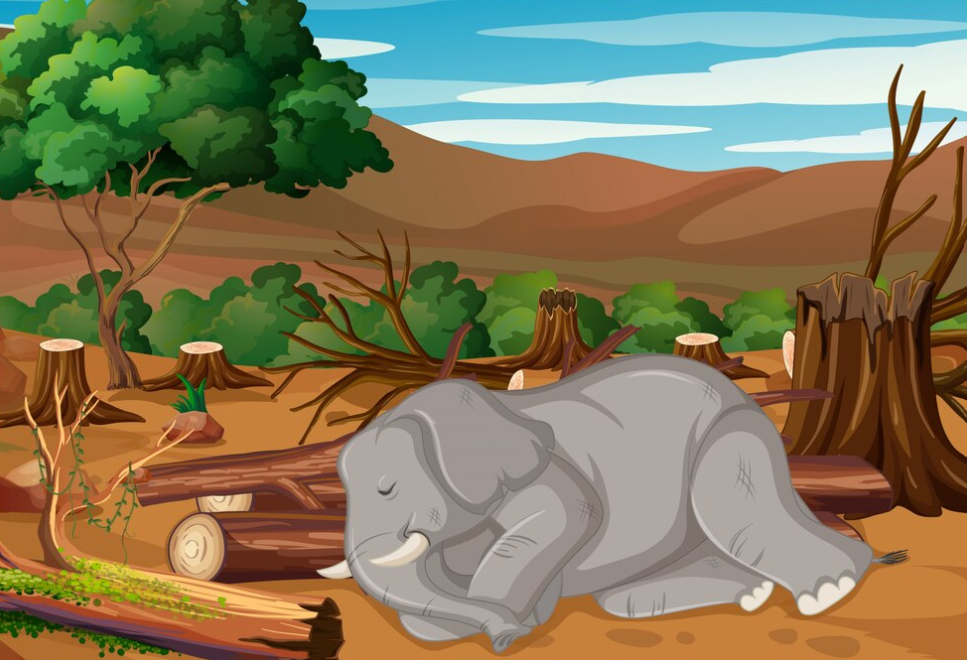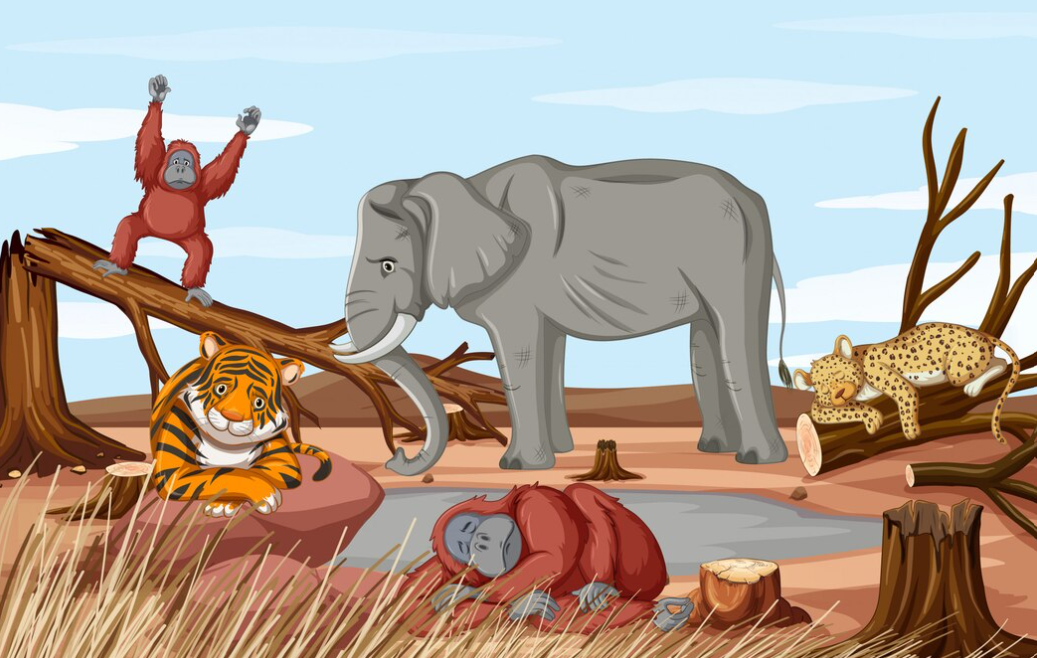Habitat destruction and deforestation affect animal population
Many animal species face serious threats to their existence as a result of habitat degradation. Numerous creatures go extinct or are displaced as a result of the loss of natural habitats, including marshes, grasslands, and forests, which upsets the delicate equilibrium of ecosystems. In addition to natural calamities like floods and wildfires, human activities like deforestation, urbanisation, and industrialization may also cause this damage.
How these activities lead to the destruction of natural habitats?
The effects of destroying habitat are severe and widespread. Animals lose access to basic necessities like food, water, and shelter when their natural habitats are destroyed. Due to the increasing competition among species brought on by this resource shortage, species numbers might drop, and even local extinctions may occur. Furthermore, habitat degradation upsets the complex web of relationships between many species, which has an influence on the ecosystem as a whole in addition to the directly affected creatures.
Discouraging habitat degradation to maintain Ecological balance
In order to preserve our planet’s biodiversity and ecological balance, we must address habitat degradation. The effects of habitat degradation may be lessened by conservation initiatives, including creating protected areas, putting sustainable land-use policies into place, and encouraging replanting.
Importance of conservation efforts in protecting habitats
We can provide animals with the circumstances they need to survive and guarantee the long-term sustainability of their populations by protecting and restoring their habitats. Additionally, encouraging sustainable lifestyles and increasing knowledge of the value of habitat conservation may motivate people to take action to protect the environments that support our variety of animal species.

How Animals Are Affected by Habitat Destruction
The global loss of habitat poses a serious danger to the survival of several animal species. It describes the act of changing or obliterating the natural habitat that serves as an animal’s home, place of birth, and supply of food and shelter. Numerous human activities, including deforestation, urbanisation, pollution, and climate change, may be at fault for this damage.
Reasons Behind Habitat Destroying
Deforestation is one of the main factors causing habitat degradation. In order to create room for logging, agriculture, or the growth of human settlements, trees are often felled. In addition to destroying many creatures’ physical habitats, the loss of trees upsets the delicate balance of ecosystems. Animals lose their supplies of food, cover, and safety when there are no trees.
Urbanization contributes to habitat degradation
Urbanization is a significant contributing factor to habitat degradation. Natural ecosystems are being replaced by infrastructure, roads, and buildings as cities and towns grow. It may be challenging for animal populations to locate partners, food, and appropriate habitats for reproduction when their movements are restricted and their habitats are fragmented.
Habitats contributes to global warming and other environmental issues
Another major factor in the degradation of habitats is pollution. Many animal species cannot live in soil, water, or air that has been contaminated by industrial waste, chemical runoff, or air pollution. Some species may decline or become extinct as a result of this pollution because they are unable to adjust to changes in their habitat.
Habitat destruction and climate change affect ecosystems
Another important aspect contributing to habitat degradation is climate change. Animal habitats may be disrupted, and ecosystems may be altered by severe weather events, rising temperatures, and shifting rainfall patterns. Numerous species experience population decreases and possibly extinction as a result of their inability to adjust to these changes rapidly enough.
Effects on Biodiversity
There are serious repercussions for animal species when ecosystems are destroyed. As a result of many species being unable to adapt to or survive in their changing environments, biodiversity may be lost. This loss of biodiversity may upset the delicate balance of nature and have far-reaching effects on ecosystems.
Animals that depend on specialised environments
Particularly susceptible to habitat degradation are animals that depend on specialised environments, such as marshes or forests. They can lose their food supplies, nesting locations, and defences against intruders. Their numbers may therefore drop, and some species may end up extinct or at risk of becoming extinct.
Animal Habitat destruction (deforestation)
The interdependence of ecosystems is also impacted by habitat degradation. Numerous creatures are essential to the cycling of nutrients, pollination, and seed distribution. These biological processes are upset when their habitats are lost, which causes further ecological imbalances.
Preservation activities to protect environment
Conservation activities have been carried out globally as a result of the realisation of how important it is to preserve animal habitats. These initiatives seek to protect and revitalise natural environments while also increasing public awareness of the value of biodiversity and the negative effects of habitat degradation.

Conservation Efforts to protect wildlife
Animal habitat conservation is greatly aided by protected places like wildlife reserves and national parks. For many animals, these places provide a secure sanctuary where they may flourish and procreate without interference from humans. Reforestation and habitat restoration initiatives also aid in the reconstruction of destroyed habitats and provide fresh chances for animal well-being.
Preservation of animal habitats
Campaigns for public awareness and education are also essential in advancing the preservation of animal habitats. People may reduce their ecological footprint by making educated decisions and taking action by learning about the value of biodiversity and the effects of habitat degradation.
Protecting animals from the effects of habitat destruction
The loss of habitat represents a serious global hazard to animal species. In order to guarantee the survival of different ecosystems and the species that rely on them, it is imperative that we acknowledge the significance of protecting and restoring habitats. We may strive towards a future in which animals can flourish in their native environments by means of conservation initiatives and raising public awareness.
